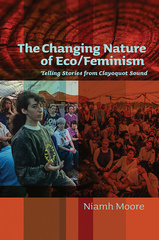
The Nature of Masculinity
Critical Theory, New Materialisms, and Technologies of Embodiment
This penetrating analysis of the relationship between gender and nature proposes that masculinity is a technology that shapes both our engagement with the natural world and how we define freedom.
Scholars of contemporary social theory and new materialisms have pointed out the increasingly porous boundaries between nature, technology, and human social relations. As the complexity of our ecosystems becomes more apparent, the line between nature and culture, human and nonhuman, and technology and bodies becomes less distinct. Yet contemporary masculinity studies has generally failed to acknowledge this new way of thinking.
Extending the work of the Frankfurt School and Heidegger’s critique of modern technology to incorporate issues of gender, Steve Garlick reassesses the connections between masculinity, nature, and embodiment. Drawing on historical and contemporary case studies (on street riots, pornography, and masturbation), as well as new materialist theories of affect, biopolitics, and complexity, The Nature of Masculinity argues that the essence of technology is not in mechanical devices but in a particular relationship to natural forces. Within this framework, masculinity is best understood as a technology of embodiment that defines how humans interact with the natural world. It follows that freedom does not lie in the domination of nature but rather in fostering a new relation to it.
This book will appeal to scholars and students of gender and sexuality studies (especially critical masculinity studies), affect studies, popular cultural studies, critical theory, and contemporary social theory.
For all of the advances in writing and thinking on men and masculinity, there is often a dramatic paucity of engagement with thinking theoretically through the most fundamental and crucial concepts of the field. It is this type of deep theoretical engagement that is crucial for scholars in this field to continue working through. Unafraid of a challenge, Garlick has pushed the field to think with new scholars and theories, a difficult and necessary thrust that we all can benefit from.
The Nature of Masculinity should be of interest totheoretically informed gender studies scholars and graduate students, particularly those in
the Humanities and social sciences who wish to see theoreticians wh
Garlick’s posthumanist approach is interesting as he incorporates contemporary feminist and posthumanist theory, thereby possibly reopening a relatively forgotten dimension of masculinity studies as he extends masculine gender relations in connection to nature, technology and the non-human … Garlick’s approach also opens up for an extended view on what masculinity politics could mean both in terms of regressive and progressive change.’
In The Nature of Masculinity, Steve Garlick provides an innovative integration of the critical theory tradition with contemporary gender theories of masculinity, focused on issues of complexity, affect, and biopolitics. These theories are deployed to yield penetrating and important insights into masculinity, technology, and human engagement with the natural world. This book offers intriguing new views into how we think, play, and love.
Steve Garlick is an associate professor of sociology at the University of Victoria. His work has previously appeared in journals such as Body & Society, Philosophy & Social Criticism, Men and Masculinities, and Critical Sociology.
Introduction: The Nature of Masculinity
1 Social Theory, Masculinity, and New Materialisms
2 Technologies of Embodiment: Toward a New Critical Theory of Masculinity
3 Autoerotic Bodies: Biopolitics, Masculinity, and Nature
4 Pornographic Bodies: Affect, Masculinity, and Technology
5 Violent Bodies: Complexity and the Spectacle of Masculinity
6 The Work of Masculinity
References; Index














